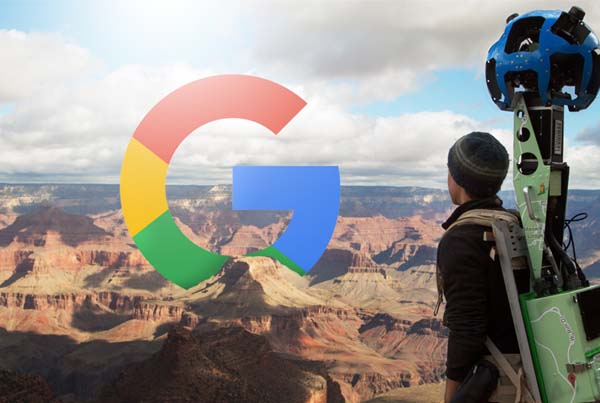There’s no longer any doubt that virtual reality is the next big interactive platform, and now it looks like you can add Google to the list of companies clamoring to stake an early claim.
That’s the indication some are drawing from a few recent Google job postings that appear to be focused on developing VR hardware.
Of course, some of the job postings listed, which were highlighted this weekend by cialis 10mg Road to VR involve Google Cardboard, the low-cost VR device that a number of companies are using to gain an early toehold in the burgeoning VR space.
But nestled amid the Cardboard job postings is a job listing for “Hardware Engineer, VR Camera Systems.” That doesn’t sound like something you’ll ever see coming to Cardboard, which is mostly a (by design) cheap, almost disposable cradle for smartphones to interface with VR apps. No, VR Hardware Engineer sounds like something… different.
The Google panoramic camera backpack rig for Google Trekker, which captures a 360-degree view of locations around the world.
The posting goes on to list (albeit vaguely) some of what the hardware engineer will work on. “You will develop opto-electro-mechanical system concepts in conjunction with various Architecture leads before reducing them to schematics,” the job listing reads. “Then, you see those schematics turned into finished boards and are responsible for the initial bring up of the hardware with the help of embedded Software Engineers.”
One other Google job post description, for “Hardware Engineering Technical Lead Manager, Consumer Hardware,” reveals a bit more about the company’s consumer VR intentions. “Lead overall engineering system integration of high-performance, battery powered, highly constrained consumer electronics products,” reads the job description.
We are building novel camera systems to capture stereo panoramic video. These camera systems will allow content producers to create amazing virtual reality experiences.” So based on those job postings alone, we know that Google is definitely developing a VR camera for use by non-Google employees, and possible something more that will likely be mobile.
Given Google’s long experience in creating panoramic imagery for both Google Street View and its Expeditions virtual toursproject, it could be that the search giant plans to put a VR camera in the hands of millions of users to help it more quickly construct a VR simulacra of the entire world. Crowdsourcing VR imagery sounds very Googlely.
Google is notorious for working on all kinds of experimental products that may never see the light of day, but this job posting seems pretty straightforward. If Google “isn’t” working on a building a VR headset, they sure are interested in knowing more about how such devices work.
The move comes just as news spread last week that Apple has also been quietly focusing new efforts on VR, most recently by hiring VR expert Doug Bowman.
What was once seen as a $2 billion gamble by Facebook with its acquisition of Oculus Rift back in 2014 is now officially a trend — VR is hot.
But despite Google’s unassailable technology might and deep bench of brainpower, the company’s track record in venturing into wearable interactive tech isn’t the best. Google Glass, a device that was used by some apps for augmented reality (AR) functions, turned out to be a huge miss with the public. Now the company appears to be repositioning the device as an enterprise play rather than the fashionable, trendy tool it attempted to frame it as before.
However, with VR things are a bit different. A VR headset doesn’t need to be fashionable or cool because it’s not an accessory, it’s a tool that you’ll most likely use either at home or the office. The bar, at least in terms of cool points, is much lower. And with a vast trove of apps and games via its Android platform, it wouldn’t take much for Google to leverage itself into a leadership position with VR just as it begins to take off.
Would a Google VR headset be similar to the low-budget Samsung Gear VR, or something closer to the pricey Oculus Rift? Well, if you follow Google’s obsession – mobile – that would indicate something closer to the Samsung Gear VR. If true, it will be interesting to see just how long the friendly VR partnership between Google and Samsung will last.
On the other hand, if it turns out that Google is just focusing on a VR camera, that’s likely to go over much better with its partners, as well as competing VR headset makers and users looking for more VR content tools.
It’s also worth noting that Google is a major investor in Magic Leap, a company that, according to my interactions with the company, will soon field an augmented reality device that will outperform anything we’ve seen in the past. It’s impossible to tell if Google’s VR hardware aspirations have anything to do with its involvement with Magic Leap, but since VR and AR are such close interactive technology cousins, the potential for some sort of pairing is hard to ignore.
Oh, and one more thing. Just over six months ago, Google registered GoogleVirtualReality.com. That could be just another intellectual property protection move, but it’s more likely that it signals a coming, stronger push into VR by Google.
In the meantime, Google’s next act, backed by an early lead in immersive photos and video, could be as one of the leaders of the new VR explosion — if the Silicon Valley behemoth can move fast enough.




